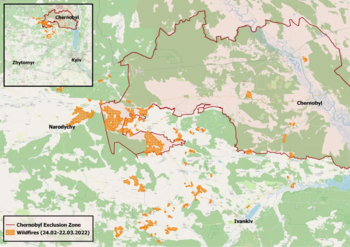
Impact of the Russian invasion of Ukraine on nuclear power plants
Ukraine is home to four nuclear power plants, as well as the Chernobyl Exclusion Zone, site of the 1986 Chernobyl disaster. As of 11 March, both Chernobyl and the Zaporizhzhia Nuclear Power Plant had seen battles during the 2022 Russian invasion of Ukraine. The invasion has prompted significant discussion about the status of the power plants, including fears of potential disasters, and has also prompted debates about nuclear energy programmes in other European countries.
Ukraine is Europe's second-largest nuclear producer, almost 50% of electricity in the country come from nuclear power plants. Nuclear plants are vulnerable to direct hits, as well as of waste-sites. Apart from direct attacks, man-made disasters may happen because of an operational mistake, power shortage, or connection issues. For instance, without electricity water cooling of nuclear reactors goes off causing their melt, like happened in Fukushima. Station's operators, working under siege in constant stress, are more prone to mistakes.
As early as February 24, 2022, the moving of heavy military vehicles raised nuclear dust and resulted in a spike of gamma radiation level in Chernobyl region 28 times higher than normal. Notably, local winds are mostly directed to Russia. Ukrainian authorities also accuse Russian army of arsons in the Chernobyl Exclusion Zone. According to different sources, from 15 to 37 hectares of forest were swept by fires.
In early March, hostilities reached Zaporizhzhia Nuclear Power Plant, the biggest in Europe and the world's fifth most powerful nuclear station. The amount of nuclear material equivalent on this site is comparable to 20 Chernobyls. On March 4, the fights led to a fire in an auxiliary building. On May 30, the IAEA reported that it had lost connection to servers of Zaporizhzhia plant. The connection was restored only on June 12.
Rafael Grossi raised concerns about the extremely stressful conditions faced by station's personnel. Under constant pressure by the Russian military, the employees were unable to rotate shifts with those colleagues who were outside the facility, and couldn't rest. Food and medicine shortages were also reported. Grossi emphasized that exhausted, stressed employees are more prone to mistakes. On June 30, the IAEA again lost connectivity to the station.
While wide attention was focused on nuclear reactors, potential damage to spent nuclear fuel reservoirs or storages of spent nuclear rods could be more devastating. For instance, more than 3000 spent fuel rods containers are stored on Zaporizhzhia plant under the open sky. At other stations, spent roads are kept in cooling tanks. If water in those tanks becomes warmer or leakes, the overheated rods will ignite. The consequences will be equivalent to the Kyshtym disaster. According to the IAEA, two Russian missiles have already hit nuclear waste ponds in Ukraine. In the meantime, spent nuclear fuel can release 20 times the fatal dose of radiation in one hour.
Battles
The Battle of Chernobyl took place on 24 February, the first day of the invasion, as part of the Kyiv offensive. Russian forces captured the exclusion zone the same day.
The Siege of Enerhodar began on 28 February, as Russian forces advanced during the Southern Ukraine offensive. The Russian assault on the Zaporizhzhia Nuclear Power Plant began on 3 March, capturing the power plant by the next day. On 6 March, the IAEA released a statement expressing concern over potential Russian military interference in the operations of the power plant and over cuts to mobile and internet networks that the plant used for communications.
Safety concerns
Since the occupation of Chernobyl and the Zaporizhzhia power plant, a number of safety concerns have been raised by the IAEA and the Ukrainian government, including over failure to give staff proper rest and lack of regular maintenance work being carried out. Pharmacies in several European countries reported selling out of iodine pills in the first two weeks following the invasion. However, several European nuclear safety authorities have to date concluded that there is no immediate danger of a significant radioactive disaster occurring.
On 6 March, French President Emmanuel Macron held a call with Russian President Vladimir Putin in which he urged Putin to "ensure the safety of these plants and that they are excluded from the conflict." Following the call, the Kremlin released a statement saying that it was willing to engage in negotiations with the IAEA and the Ukrainian government over ensuring that safety.
Debates over nuclear power in Europe
The invasion of Ukraine has prompted increased discussion about the future of nuclear power in Europe, with a number of commentators arguing in favour of increasing nuclear power generation in order to decrease dependence on natural gas imported from Russia.
Germany in particular has seen debates over nuclear power phase-out, which has overseen the shutdown of most of the nuclear power plants in the country since 2011, with the remaining three also due to be shut down. On 28 February, the German economics minister stated that the German government would consider suspending the phase-out of remaining nuclear power plants in the country. However, on 9 March, Germany released a statement rejecting calls to suspend the phase-out of nuclear power. Belgium has also seen debates about extending the life span of its existing nuclear reactors.
George Monbiot wrote in The Guardian that Europe "collectively receives 41% of its gas imports and 27% of its oil imports from Russia," arguing that Europe "reduced ourselves to craven dependency on that despotic government, through a dismal failure to wean ourselves off fossil fuels."
Some commentators have also raised issues of Russian exports of nuclear energy technology. In Finland, the Hanhikivi Nuclear Power Plant project was cancelled due to the invasion. Hartmut Winkler of the University of Johannesburg has stated that Russian state nuclear energy corporation Rosatom faced significant loss of international business due to the invasion, stating that the "era of Russian foreign nuclear builds is therefore soon likely to be over."
